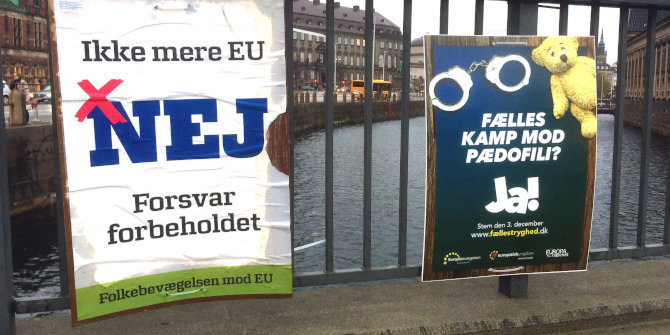Looking at the case of the Catalonia independence debate, Joan Balcells and Albert Padró-Solanet find that the popular perception of social media as creating polarised echo-chambers of extreme political opinions is far from the full picture. They find evidence that Twitter can foster engaged, substantive conversations across partisan lines. This picture demonstrates how social media has the capacity to genuinely improve democratic discussions, and open up arenas of public debate.
Obama’s 2008 primaries and presidential campaign inaugurated a new era of political communication where politicians, communication practitioners and academics ultimately acknowledged the key role of social media. As if it were a kind of Pandora’s box – from a democratic perspective – the first elements that emerged from this new world seemed unmistakably good: decentralised popular mobilisation around Obama’s campaigns was seen as the first signs of the democratic revival prophesied by the technological utopians a long time before. At last, technological development seemed to counterbalance the overwhelming economic and political forces of the establishment. Ten years later, the mood has changed. Since the 2016 American presidential election, concerns are focused now on the potential of disinformation, fragmentation and polarisation of the public space. And, among the traditional media and political establishment, there is an almost unanimous consensus on the risks for democracy of the new digital communication environment.
Within this context, we were interested in exploring whether the political discussions on social media – specifically, on the micro-blogging platform Twitter – can be accurately characterised as a kind of Hobbesian state of nature, where, under the mask of anonymity, opinions irresponsibly clash against each other in a nasty and brutish way. Against these expectations and in part to our own surprise, using as a case study the Twitter debate on Catalonia’s independence, we found significant conversations discussing the issues and reasons for and against Catalan secession. Even more remarkably, our research points to the conclusion that this deliberative ‘cooperation’ can emerge even between citizens that lie behind opposing trenches.
Our analysis was based on a sample of conversations carefully designed to contain a balance of for and against opinions on the issue of independence, mirroring the diversity of Catalan society. Against the ‘echo-chamber’ hypothesis, which would predict that individuals mainly interact with those who think similarly, we found that crossing lines of difference was rather a common practice, with 55% of the analysed conversations involving interactions between individuals who hold opposing views (that is to say, between supporters and opponents of independence). Though remarkable, this finding is far from novel. The first studies based on the analysis of links in political blogs (e.g. Adamic & Glance 2005) already showed that interactions between opposing sides were rather usual – although mostly driven by a reinforcement bias.

Image by edar from Pixabay
The key finding in our research takes one step further. We observed that when individuals cross lines of difference conversations last longer, meaning that disagreement is actually a trigger for longer conversations. The more extended conversations – and, therefore, the richer and more complex ones – involved the participation of individuals with opposing views. To be sure, these conversations tend to have a pronounced theatrical and agonistic component. The main participants are usually accounts that specialise in the issue under discussion. In the case of users with a good reputation and large number of followers, there is an attentive audience on both sides, always ready to participate, performing as the choir of a classical tragedy, punctuating each phase of the debate, applauding the victorious rhetorician, or mocking the defeated one. Like in a medieval singular combat, the opponents try to find the definitive arguments and deductions that show their side is the right one and that they are backed by good reasons, while the other side is wrong and, if honest, would yield to the unforced force of the better argument.
However, two caveats qualify this finding. First, when crossing lines is combined with too much disagreement – that is to say, when individuals discuss from extreme positions – conversations are less likely to last long, and the chain of replies is more likely to get interrupted. There might be several mechanisms at play here, but, remarkably, it seems that some users refuse to continue talking when conversations stop being reciprocal (for instance, when questions are not answered, or the conversation is reduced to talking past each other), when positions are so distant that there is no possible middle ground for discussion, or when interactions degenerate into aggressive exchanges such as personal attacks. Second, extremism only has a positive impact on the length of discussion when conversations involve like-minded people. This shows that there is obviously debate within each of the two contending sides, without the necessity of crossing lines. Although this debate can be the expression of agreement and a reinforcement of positions, it can also be the result of opinion diversity and disagreement within intra-block ranks.
Overall, this case illustrates the potential of social media to become an autonomous sphere for public discussion. Although social media communication may be flawed by serious deliberative problems and pathologies, it can also enhance a more grassroots democracy. Social media provides an open arena where information can be shared and discussed beyond the elite control over the agenda. That is a kind of permanent check on one of the ultimate expressions of power: the capacity to decide what can be discussed and what cannot. Proof of the potential of these media for disruption and dissent lies in the fact that the control of cyberspace has become one of the main political battlefields, even a matter of raison d’état. In a polemical tweet that became viral, Julian Assange, one of the best-known figures behind the growth of hacktivism, stated that the world’s first internet war started in Catalonia in occasion of the 2017 non-authorised self-determination referendum, when the Spanish state decided to shut down websites and block internet communications to stop the referendum. Researchers (Stella, Ferrara & De Domenico 2018) also detected an anomalous increase in the activity of Twitter bots before, during and after voting day, mostly targeting pro-independence users and aimed at spreading hostile and negative messages to exacerbate conflict. Obviously, a violent move would have discredited the peaceful reputation of the pro-secession movement and would have more easily justified repression against it. However, the risk of manipulation, flaming and uncivil communication should not lead to throwing out the baby with the bathwater. Our research suggests that practices of civil debate between online participants on opposing sides of an issue are not only possible but could act as a buffer against extreme polarisation online.
Please read our comments policy before commenting.
Note: This article draws on the authors’ paper ‘Crossing lines in the Twitter Debate on Catalonia’s Independence‘, recently published in the International Journal of Press/Politics. The article originally appeared at our sister site, Democratic Audit. It gives the views of the authors, not the position of EUROPP – European Politics and Policy or the London School of Economics.
_________________________________
Joan Balcells – Open University of Catalonia
Joan Balcells is a Lecturer in Political Science at the Open University of Catalonia. His research focuses on the impact of ICT on democratic politics, public opinion and deliberation.
Albert Padró-Solanet – Open University of Catalonia
Albert Padró-Solanet is a Lecturer in Political Science at the Open University of Catalonia. His research interest lies in digital politics, with a focus on political parties and online deliberation.





